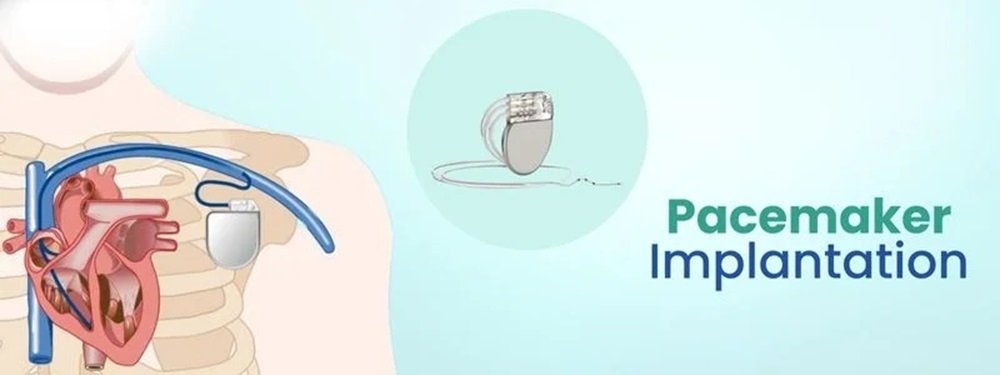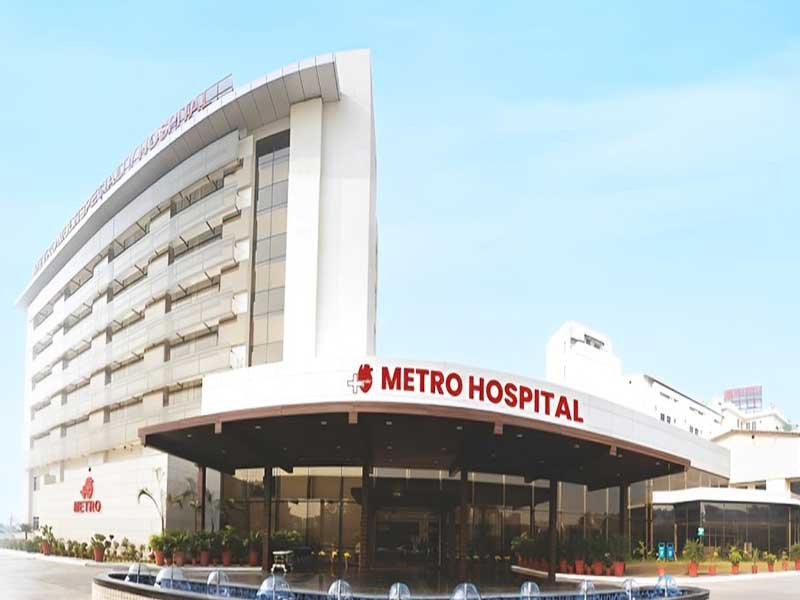Pacemaker implantation in India is a top choice for international patients and the reason is affordable cost.
Recovery Time
2 Weeks
Success Rate
98%
Hospital Stay
2 - 3 Days
Treatment Type
Surgical
Home Treatments Cardiology Pacemaker Implantation
Are you looking for an affordable solution for pacemaker implantation?
India offers world-class pacemaker procedures at a fraction of the cost for patients seeking cost-effective treatment.
Hospitals in India are equipped with the latest technologies and have some of the best cardiologists, ensuring safe and effective procedures.
By choosing India, you will receive high-quality care at lower prices without compromising on the standard of care.

A pacemaker implantation is performed to correct a heart rate when the heart is beating too slowly and causing symptoms such as Bradycardia, Tachy-Brady syndrome, and Heart block that can't be resolved with other treatments.
This procedure is essential when the heart's rhythm is compromised, leading to insufficient blood flow to the body.
By regulating the heart's rhythm, a pacemaker ensures that the heart pumps blood efficiently, addressing symptoms such as fatigue, dizziness, or fainting spells associated with bradycardia (a slow heart rate).
The cost of pacemaker implantation in India is much lower than in Western countries. However, the total cost depends on various factors such as hospital stay, evaluation costs, and overall surgical expenses. Here is a brief breakdown of the cost:
Cost Component | Details | Estimated Cost in USD |
Pre-operative Consultation & Diagnosis | Consultations, X-rays, MRI scans, blood tests | 600 USD |
Surgery Costs | Includes surgeon fees, type of surgery, type of implant, and hospital stay | 4500-5500 USD |
Rehabilitation and Follow-up | Physiotherapy sessions, medications, supportive devices, follow-up visits |

Country | Cost Structure |
India | 4500-5500 USD |
United States | 19000-96000 USD |
Germany | 10800-13200 USD |
Turkey | 21000-24000 USD |
◾Key Takeaways
✅Affordable Treatment Costs: India provides affordable pacemaker implantation without compromising on the quality of care. With advanced technology, world-class facilities, and top cardiac surgeons, you can receive high-quality care at a fraction of the cost compared to Western countries.
✅Advanced Medical Technology: India is equipped with the latest technologies for pacemaker implantation, ensuring precise and safe procedures. Technologies like dual-chamber and leadless pacemakers offer improved functionality and longer battery life.
Pacemaker Implantation cost
Treatment Name
Estimated Cost
Pacemaker Implantation Single Chamber 4500-5500 USD Pacemaker Implantation Dual Chamber 6000-6500 USD
India offers exceptional quality care for pacemaker implantation, combining advanced medical technology with highly skilled cardiac surgeons. Here are some key factors that contribute to the high standard of care:
These surgeons are highly experienced and many of them are internationally trained and are dedicated to providing quality care for patients seeking pacemaker implantation in India.
Beds: 539
New Delhi
Beds: 230
New Delhi
Beds: 710
New Delhi
Beds: 650
New Delhi
Beds: 191
New Delhi
Beds: 310
New Delhi
Beds: 299
Gurugram
Beds: 380
New Delhi
Beds: 402
New Delhi
Beds: 1300+
Gurugram
Beds: 1000
New Delhi
Beds: 450
Faridabad
Beds: 675
New Delhi
Beds: 500
New Delhi
Beds: 400+
Faridabad

Max Super Speciality Hospital, Saket

Aakash Healthcare Super Speciality Hospital

Indraprastha Apollo Hospital

BLK Max Super Speciality Hospital

Dharamshila Narayana Superspeciality Hospital

Fortis Escorts Heart Institute

Fortis Memorial Research Institute

Manipal Hospital Dwarka

Max Super Speciality Hospital Shalimar Bagh

Medanta - The Medicity Hospital

Moolchand Kharaiti Ram Hospital

Sarvodaya Hospital

Sir Ganga Ram Hospital

Venkateshwar Hospital

Metro Heart Institute with Multispecialty
Hospitals in India are equipped with some latest advancements and have the best medical options in pacemaker implantation that provide surety in providing quality care for patients seeking pacemaker implantation in India.

Advancements in pacemaker technology have significantly transformed cardiac care in India, making treatments safer, more cost-effective, and more patient-friendly. Innovations such as MRI-compatible pacemakers, rate-responsive pacing, remote monitoring, and leadless pacemakers have improved the reliability of these devices and enhanced the quality of life for patients.
These advancements offer more comfortable and minimally invasive treatment options, leading to better patient outcomes and personalized care. Key advances include:
Types of Pacemaker Surgery
This technique involves using one lead wire to connect the pulse generator to one chamber of the heart, typically the right ventricle. It is usually recommended for patients who need pacing support only for the right ventricle.
In this approach, two lead wires connect the pulse generator to two heart chambers, specifically the right atrium and the right ventricle. This helps coordinate the contraction of both chambers, improving heart function.
Before implantation, cardiologists may order a variety of tests to determine if a pacemaker is the right treatment for a patient's heart condition. These tests include:
Tests | Description |
Electrocardiogram (ECG) | This test measures the heart's electrical signals, heart rate, and rhythm to detect any irregularities. |
Echocardiogram | A transducer placed on the chest creates a moving image of the heart, helping doctors assess the heart's structure and function. |
Holter Monitor | This portable device is worn by the patient and continuously records the heart's electrical activity over 24 to 48 hours. |
Fluoroscopy | A special type of X-ray is used to help check the positioning of the pacemaker leads during the procedure. |
🟢Do’s Before Surgery
✅Follow Fasting Instructions: You will be asked to fast overnight before the procedure. Make sure to ask your doctor when to stop eating and drinking before the surgery.
✅Take Medications as Instructed: Only take the medications your doctor has prescribed and follow their instructions regarding when to stop or make changes to your medications.
✅Shower with Chlorhexidine: Clean yourself with chlorhexidine before the procedure to help prevent any infection.
✅Remove Jewelry and Contact Lenses: Make sure to remove all jewelry, piercings, and contact lenses before the procedure begins.
✅Arrange Transportation: Organize a ride home from the hospital, as you won’t be able to drive yourself after the procedure.
✅Notify Your Doctor if Pregnant: Inform your doctor if you are pregnant, as it can affect the procedure.
🔴Don’ts Before Surgery
❌Don’t Eat or Drink Without Doctor’s Approval: Avoid eating or drinking for the time specified by your doctor before the procedure.
❌Don’t Take Certain Medications: Stop taking any medications your doctor has asked you to stop, such as blood thinners unless instructed otherwise.
❌Don’t Hide Important Health Information: Be honest with your doctor about any health problems, such as allergies, fever, or if you are pregnant, as these can affect the procedure.
After pacemaker implantation, you may spend a few hours or overnight in the hospital. During this time, your healthcare provider will:
The success rate of pacemaker implantation is extremely high with rates greater than 98%. Yet it depends on how the patient is carrying himself or herself during the recovery period.

Pacemaker implantation can have several potential complications, including:
Twiddler's Syndrome: This happens when the pacemaker generator is unintentionally moved out of position due to repeated movements, such as twisting or rotating the device under the skin without realizing it.
Why Choose Mejocare for Pacemaker Implantation in India?
✅Team of Top Cardiologists: We recommend doctors with more than 20 years of experience, to ensure high-quality care and successful outcomes for your treatment.
✅JCI/NABH Accredited Hospitals: We partner with hospitals that have state-of-the-art facilities, equipped with the latest technologies such as robotics, machine learning, and advanced diagnostic and therapeutic equipment. These hospitals provide comprehensive and personalized care.
✅Other Benefits: We offer fast and detailed responses, accurate cost estimates, assistance with obtaining medical visas, and accommodation arrangements in India. We also provide priority appointment scheduling with top doctors. Additionally, we ensure a smooth arrival in India by offering airport pickup, hotel drop-off, hospitalization assistance, and more.
Pacemaker Implantation is a procedure where a small device is placed in the chest that helps regulate the heartbeat. It helps to improve symptoms such as fatigue and fainting by ensuring the heart beats regularly, but when it's done patients need to follow post-implantation instructions and attend regular checkups. Overall, it helps to enhance the quality of life for patients with heart problems.

Medically Reviewed By
Dr. Aryan Malhotra is a highly respected and compassionate medical professional with a strong academic background. He holds an MBBS and MD degree from DTMU University in Georgia. Driven by a deep sense of duty, he is dedicated to providing exceptional care to his patients.
The average cost of a Pacemaker Implantation in India is 4500-5500 USD.
The success rate of Pacemaker Implantation in India is 98%.
The survival rates following Pacemaker Implantation in India indicate encouraging statistics: 90.0 percent at 1 year, 82.1 percent at 2 years, 74.1 percent at 3 years, 67.2 percent at 4 years, and 58.3 percent at 5 years. These figures offer insight into the long-term success and endurance observed post-implantation.
Pacemaker surgery is generally safe but might lead to complications such as infections, bleeding, blood clots, nerve or blood vessel damage, or rare occurrences like a collapsed lung or device shifting
Yes, it is necessary to have a companion
You can typically travel after 2-3 days following Pacemaker Implantation if your doctor confirms no issues with the device.
Yes, you can do your own research and choose your physical therapist.
For managing post-implantation pain after a pacemaker procedure in India, various medications are available to address neuropathic pain. These include systemic analgesics such as opioids, and topical lidocaine, as well as drugs like gabapentin, pregabalin, and specific antidepressants.
Yes, insurance companies will cover it.
4 to 6 weeks after surgery, you might be able to resume work or your regular schedule. The frequency of the Pacemaker checkups will be discussed with you by your doctor. You must take precautions to operate electric appliances safely.
To discover the top doctors or hospitals in India, you can visit our website, mejocare on the doctors' page, you can filter and find the finest doctors, while on the hospital page, you can identify the best hospitals. Additionally, you can reach out to us, and we will gladly offer you all the necessary suggestions and information you need.
It usually takes 30-60 minutes
No, there is no waiting list for Pacemaker Implantation in India
You may have to stay for 1-2 days in the hospital
Before the surgery, various tests might be necessary, including an electrocardiogram (ECG), blood tests, and a chest X-ray, among others.
Generally, doctors use local anesthesia to numb the area where the incision is made during a pacemaker implantation in India.
Most patients receiving a Pacemaker implant typically stay in the hospital for about 1 day after the treatment.
4 to 6 weeks after surgery, you might be able to resume work or your regular schedule. The frequency of the Pacemaker implantation checkups will be discussed with you by your doctor.
After getting a Pacemaker, maintaining a heart-healthy diet is crucial. Focus on low sodium, high fiber, and omega-3 fatty acids to lower heart risks. Avoid high-fat meats, and pastries, and include fruits, veggies, and whole grains daily while cutting down on sodium intake for a healthier heart.
Climbing up and down the stairs can be resumed 2-3 weeks after surgery.
The hospital takes care of your vitals, minimizes complications, manages dressings and diet, and arranges discharge and follow-up.
Our care team can help you.
